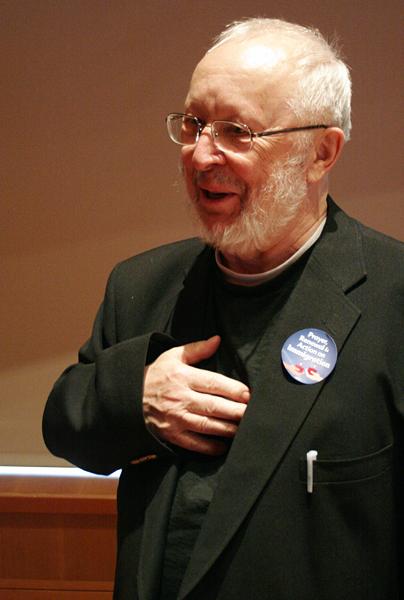
Ouderkirk, who had retired from priesthood prior to the raid, is the de facto director of relief work in the town. Ouderkirk has been interviewed and quoted by news organizations such as CNN and The New York Times.
What conditions did you play witness to within the plant that the workers were subject to?
One of the things I’ll never forget is people standing shoulder-to-shoulder, a man with an electric knife, all day, cutting the legs off the turkeys and chickens, but right [under] him, people cutting meat, and the floor filthy with feathers and blood—it was dangerous.
Speaking on a larger scale, since the presidential campaign began there was very little discussion about immigration in the actual campaigning. Since Obama has taken office there doesn’t seem to be much focus on it at all. I was wondering what you think about the current administration and Congress’s overall focus and action on the issue of immigration?
I think I’ve said often that every elected official that had anything to do with immigration law should hang their head in shame. They have let immigration law become a political mess that it’s now more political than anything.
One of the worst things was in the year 2003 they swept immigration law under Homeland Security law—the worst thing that could have possibly happened. Then it became militaristic. That was all political. They stood around. The elected politicians did not stand up for the right thing. They didn’t do the right thing.
And on a state level, late last year, you said that Governor Culver was failing to keep us from “bleeding to death.” Have Culver and the state government responded in the past months since then?
No, in fact, the governor turned his back on [The Archbishop, myself, Paul Real, and three other representatives from the Hispanic ministry and dioceses] the day we went down to see [Secretary of Homeland Security] Janet Nepolitano. He knew who we were. He turned his back on us. He has not been responding.
I would criticize the state of Iowa. They have not done enough. This is the largest raid in the history of Iowa. They have not stood up and said, “We can’t do much as a state, but now on a federal level we expect [the government] to do more.” And, they have not done that. That’s wrong.
With the situation at Henry’s Turkey Service [in which mentally disabled men were subject to illegal workhouse conditions for years], is there anything you can draw comparisons between the two situations? And whether that’s a problem on a statewide level or a nationwide level?
Once you have an ingrained immoral condition in the community, it takes an exceptional person to stand up and say, “This is wrong.” And they don’t want to upset the community. And I think that’s the way it was with what happened with Henry’s Turkey [Service]. The people had accepted a condition that was not good. I read somewhere that some inspectors never ever went in there to inspect those places.
And the apartments in Postville – some of the ones we’ve been in, man, they should have been closed the next day. And they didn’t because they didn’t have a housing code and so on. And I think you’d find that all around the country, especially in small communities. We’ve called a number of them, just like us. [The businesses] are bigger than us, but it’s the same. Unless good people get together and say no more then nothing happens.


















































